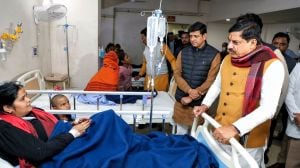More SEZs ahead
Regular allegations of doublespeak 8212; that the CPM says one thing in Delhi and another in Kolkata 8212; have affected it enough for party General Secretary Prakash Karat to respond with the assertion that his party will continue to refute the 8220;modern day Narodniks8221;.

Regular allegations of doublespeak 8212; that the CPM says one thing in Delhi and another in Kolkata 8212; have affected it enough for party General Secretary Prakash Karat to respond with the assertion that his party will continue to refute the 8220;modern day Narodniks8221;.
In a front-page article in People8217;s Democracy, he goes back to the CPM central committee resolution of 1994 on West Bengal8217;s industrial policy. He says the 8220;stark reality8221; of poor state finances did not allow the Left Front government to implement its alternative policy programme. Hence, the party8217;s approval for state government8217;s efforts to solicit private investment for industrial development.
Elsewhere he writes: 8220;If there are going to be SEZs all over the country, there will be SEZs in West Bengal.8221; His charge is Left-led governments will 8220;always be circumscribed8221; by the fact that states have very limited powers and resources actually rest with the Centre.
Remembering 1857
To mark the 250th anniversary of the 8216;Revolt of 18578217;, a series of articles are being published in the CPM8217;s weekly organ, the first of which is Irfan Habib8217;s 8216;Remembering 18578217;, along with rare photos and sketches.
Habib suggests that 1857 weakened the capacity of British imperialism since it could no longer rely on Indian troops. He says before 1857 there were over 2,00,000 Indian sepoys in the three presidency armies. But, this was reduced to 1,21,000 by 1862-63, while European soldiers in India was increased from 38,000 to 76,000. There was now one European soldier to watch over every two Indian sepoys. 8220;The grand designs of British imperialism which had been based on the use of Indian troops as cannon fodder, could no longer be pursued with the same eacute;lan. To this extent, 1857 helped to shield other Asian nations from British onslaughts for a long time,8221; says the well-known historian.
Crisis in countryside
Leftist economist Prabhat Patnaik focuses on the crisis in India8217;s countryside saying the government only visualises it as an agricultural crisis, while the Left perspective points to a crisis leading from neo-liberal economic policies. Patnaik points out that the Left remedy requires organisational changes 8220;away from atomised, individual farming with dubious resilience8221;. The move must be towards co-operative and collective forms in which the peasants have to organise themselves to take advantage of the economies of scale and acquire greater bargaining strength. They must ensure that technological change, when it reduces labour demand, does not cause destitution. Patnaik urges that 8216;investment8217;, 8216;modernisation8217;, 8216;efficiency8217; and 8216;productivity increases8217; are terms which have to be looked at within a class context.
Compiled by Ananda Majumdar
- 01
- 02
- 03
- 04
- 05






























